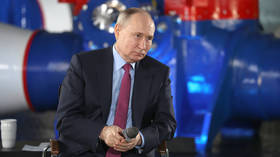
The president says industrial heavyweights are moving their plants abroad where energy is cheaper, including the US

Russian President Vladimir Putin meets with students and employees of industrial enterprises of Chelyabinsk region at the Stankomash industrial park in Chelyabinsk, Russia. © Sputnik/Aleksandr Rjumin
The German government’s decision to switch from Russian gas to more expensive energy sources is having a negative effect on the country’s economy, President Vladimir Putin has said. He added that Western leaders had apparently hoped that Moscow would fold quickly if shunned by the European market, but they miscalculated.
The EU’s economic powerhouse had for years benefited from relatively cheap Russian energy, receiving up to 40% of its gas imports from the country. Following the start of Moscow’s military operation against Kiev in February 2022, Berlin moved to radically reduce its dependence on Russian energy by importing LNG through European neighbors and boosting pipeline gas flows from Norway and the Netherlands.
Speaking on the economic situation in Germany in an interview with Russian media released on Sunday, Putin said: “Apparently, they were expecting that if they don’t take our gas, we will fall apart faster than they face irreversible processes. But irreversible processes are effectively starting to happen.”
According to the Russian president, “industries are moving to other countries, including the US, where more favorable conditions have been created, and where energy has proven cheaper.” He added that “it’s absolutely obvious” that the policies adopted by Chancellor Olaf Scholz’s government are “dealing a colossal blow to the German economy’s future.”
Putin noted that Russia is not restricting gas exports to Europe – Germany and other nations are making that choice of their own accord.

Read more
Meanwhile, Russia has managed to reroute some of its energy exports elsewhere, the president said, adding that the situation has proven to be a blessing in disguise, as Russia has been forced to focus more on other industries as opposed to relying solely on gas revenue.
Last week, Bild news outlet, citing Siegfried Russwurm, the head of the Federation of German Industries (BDI), reported that one in three German manufacturers is considering moving production overseas – double the number recorded in 2022.
Russwurm put the trend down to a general slowdown in economic growth and high rates of inflation, especially with regard to energy. These factors have resulted in less investment and made it more difficult for businesses to conduct long-term planning, he explained.
Bloomberg News, citing separate analyses, has concluded that Germany’s status as an industrial superpower is “coming to an end” after cutting off Russian gas imports.
Speaking in the German parliament in mid-January, Vice Chancellor and Economy Minister Robert Habeck said the country has “lost [its] competitive advantage.”




